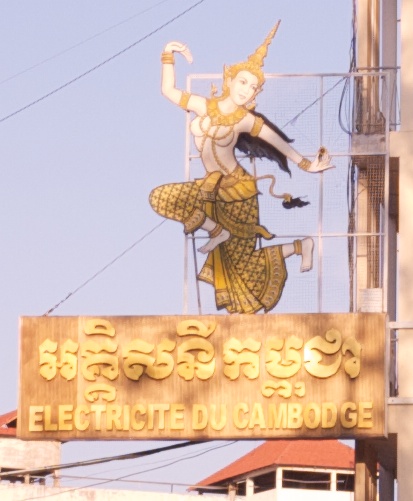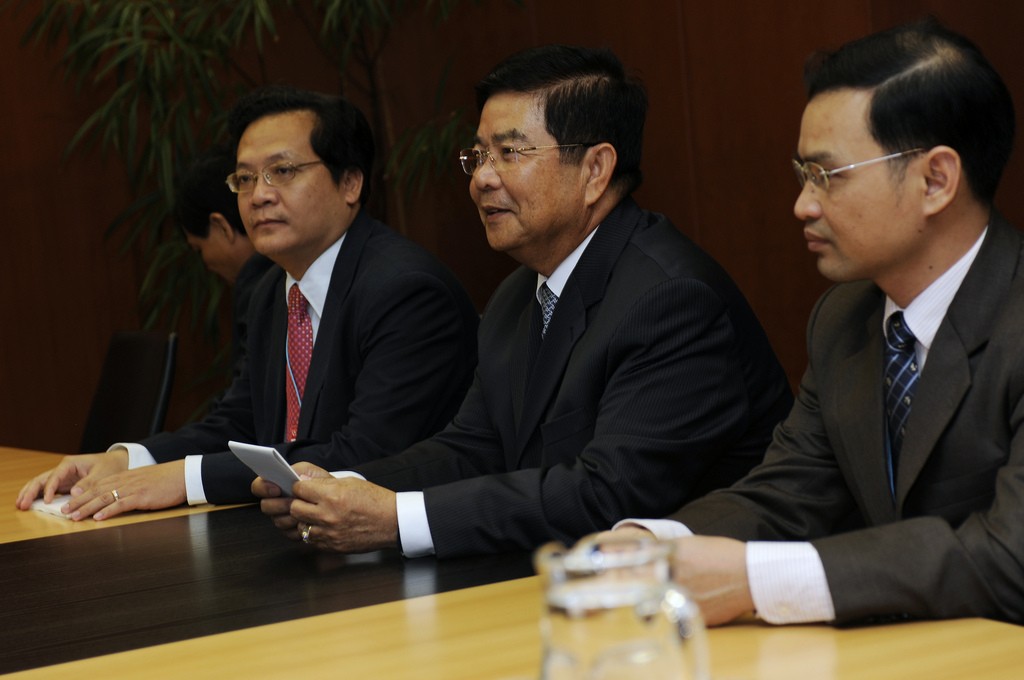
Electricite du Cambodge (EdC). Photo by bmeabroad, taken on 10 November 2011. Licensed under CC BY-NC-SA 2.0.
Low electrification rates and over-dependence on fossil fuel imports have contributed to Cambodia ranking 120 out of 124 nations in the new World Economic Forum’s Global Energy Architecture Performance Index Report (EAPI) for 2014. The score is calculated by averaging the country’s scores in economic growth and development, environmental sustainability, access to energy and energy security.1 A significant shortfall of energy supply remains one of the greatest challenges for the Cambodian economy. Developing the energy sector is a key priority of the country’s National Strategic Development Plan for 2014–2018.
Policies on energy development
According to the Master Plan of the Ministry of Mines and Energy, all 23 provinces and Phnom Penh will be connected to the national power grid by 2018.2
The Power Sector Strategy 1999-2016 aims to ensure a nationwide energy supply at affordable prices, so as to facilitate investment and development of the economy. The strategy encourage the exploration and utilization of socially and environmentally friendly energy resources.3
The Renewable Electricity Action Plan (REAP) 2002–2012 aimed to provide cost-effective and reliable electricity to rural areas through renewable energy technologies.4 As part of REAP, Rural Energy Fund (REF) was formed in 2005 with World Bank assistance, and transferred to EdC in 2012. Throughout 2013, EdC provided US$4 million in funds for the REF to provide grant assistance for electricity connections to rural households, units of home solar power systems and funds for private licensees to invest in electricity infrastructure in rural areas.5
The Rural Electrification by Renewable Energy Policy 2006 aims to create an enabling framework to increase rural electricity rates through renewable energy resources. Its key objective is that 2020, 100% of rural villages should have access to electricity and that by 2030; at least 70% of the nation should have access to the country’s electricity grid.
The Renewable Energy Development Program aims to target the remaining 30% of rural households through national grid electrification, mini-grids, and battery lighting. Through the 2006 policy, the Master Plan Study on Rural Electrification by Renewable Energy was developed to guide the implementation of renewable energy projects and programs. Hydropower has been seen as key to achieving these goals with a planned 70% of all future power in Cambodia being generated by hydroelectric dams. 15% of rural electricity is targeted to come from renewable energy sources by 2015.6
Legal and administrative framework

Meeting between IAEA Director General Yukiya Amano and HE Mr. Suy Sem, Minister of Industry, Mines and Energy, from the Government of the Kingdom of Cambodia. Photo by IAEA Imagebank, taken on 25 November 2011. Licensed under CC BY-SA 2.0.
The Electricity Law was passed in early 2001 with the aim of regulating the power sector, protecting consumers and ensuring a reliable and adequate supply of electricity at a reasonable cost. The law also sought to promote private investment and ownership of power facilities, and to encourage competition in the sector.7
The roles of the main actors in the power sector are set out below.
- The Ministry of Mines and Energy (MME) is responsible for developing policies and strategies, power development plans, overseeing the electricity trade with neighbouring countries, major investment projects and management of the rural electrification sector.8 Along with the Ministry of Economy and Finance (MEF), MME is the joint owner of Electricité du Cambodge (EDC).9
- In 1996, Electricité du Cambodge (EdC) became a wholly state-owned limited liability company, with responsibility to generate, transmit and distribute electricity throughout Cambodia.10 Its main functions are supplying electricity, developing the transmission grid and facilitating import and export of electricity to and from neighbouring countries.11
- The Electricity Authority of Cambodia (EAC) is the power sector regulator, and is responsible for granting licenses, approving and enforcing performance standards, and determining tariffs, rates and charges for electricity. The EAC may grant various types of electricity license, including licenses for generation, transmission, distribution, retail, or a combined license.12
- The Ministry of Environment (MoE) reviews and approves Environmental Impact Assessments (EIAs) and Environmental Management Plans (EMP) for all energy related projects.13
- The Ministry of Water Resources and Meteorology (MOWRAM) issues water licenses for hydropower projects14
- The Department of Forestry and Wildlife in the Ministry of Agriculture, Forestry and Fisheries (MAFF) has responsibilities relating to the management of wood-fuel and the production of crops as a source of renewable energy.
- Independent Power Providers (IPPs) are private companies that have received a license from the EAC to generate electricity for public consumption. IPPs generate electricity and sell it to the EDC, who then distribute to the national grid.15
- Rural Electricity Enterprises (REEs) are privately-owned electricity providers, who provide power in rural areas. Although approximately 600 REEs provide power through diesel-based mini-grids and over 1000 operate battery charging stations, only around 250 REES are actually licensed by the EAC.16
Last updated: 2 October 2015
Related to energy policy and administration
- Energy
- Energy policy and administration
- Non-renewable energy production
- Renewable energy production
- Hydropower dams
References
- 1. Morton, Eddie. 2013. “Cambodia Low on Energy Ranking.” The Phnom Penh Post, 12 December 2013, Business sec. Accessed 20 June 2015. https://www.phnompenhpost.com/business/cambodia-low-energy-ranking
- 2. CDRI & ANZ Bank, “Cambodia Outlook Brief No4: Strengthening Key Sectors for Cambodia’s Return to Growth, Sustainable Development and Poverty Reduction: Energy and Rail Infrastructure,” 2010.
- 3. Royal Government of Cambodia. Power Sector Strategy 1999-2016. Phnom Penh.
- 4. Deshmukh, Ranjit. “Sustainable Development of Renewable Energy Mini-grids for Energy Access: A Framework for Policy Design”.
- 5. REF. “Report on Activities of the Department of Rural Electrification Fund for the Year 2013.” Phnom Penh. http://ref.gov.kh/page/admin/public/filedownload/pro_ref%20report%202013_eg.pdf.
- 6. Ministry of Industry, Mines and Energy, Electricité du Cambodge. Progress of Cambodia Power Development Plans & Transmission Interconnection Projects. Presentation. Accessed 10 June 2015. http://bit.ly/1IYUcN2.
- 7. Electricity Law, 2001. Articles 1 & 2.
- 8. Electricity Law, 2001. Articles 3 & 4.
- 9. World Bank, Energy Sector Strategy Review: Issues Paper, April 2006 (p.8).
- 10. “About EdC.” Electricité Du Cambodge (EdC). Accessed 22 June 2015. http://www.edc.com.kh/aboutus.php.
- 11. World Bank, Energy Sector Strategy Review: Issues Paper, April 2006 (p.9).
- 12. Electricity Law, 2011 (Chapters 3 & 4); see also, Electricity Authority of Cambodia website, http://www.eac.gov.kh/index.php, and http://www.eac.gov.kh/licenses.php.
- 13. Law on the Environment Protection and Natural Resource Management, 1996. Article 6.
- 14. Law on the Water Resources Management, 2007. Article 12.
- 15. World Bank, Energy Sector Strategy Review: Issues Paper, April 2006 (p.9).
- 16. IED Innovation Energie Développement. Support Study for DFID: Identifying the gaps and building the evidence base on low carbon mini-grids. 2013. https://www.gov.uk/government/uploads/system/uploads/attachment_data/file/278021/IED-green-min-grids-support-study1.pdf.

